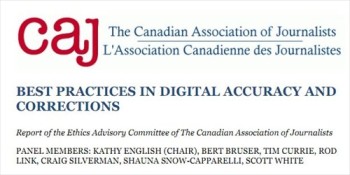
(Credit: CAJ, screenshot)
The Canadian Association of Journalists’ ethics advisory committee created an updated “best practices in digital accuracy and corrections.”
The committee published its results in mid-November here.
According to the report, the committee created a similar report in 2010 that established three principles: news outlets shouldn’t unpublish, news outlets should be quick to update or correct reports, and news outlets should be transparent about any changes to online content.
For this year’s examination of the issue, the committee reviewed news outlets’ current practices and “available literature.”
The committee “recommended best practices in digital accuracy and corrections.” The 2011 report listed a few “emerging best practices,” including making it easier for readers to let news outlets know of any errors in a report, being transparent when making any corrections, and giving any corrections a prominent “placement” online. The paper advised create easy ways for readers to contact the newsroom with errors, like a Report an Error function or a special Twitter feed for errors.
The committee also called on journalists to “be transparent with audiences throughout the reporting process about what we know and when we know it” especially during breaking news events.
The paper also noted that “sometimes a correction is not enough” and news outlets have to retract. When retracting a story-specifically in response to potential libel lawsuits — the committee notes that retractions should be “full and fair, published within three days (at least in Ontario) after receiving the libel notice, [and] in as conspicuous a place as the original libel.” However, the committee noted that there haven’t been any legal precedents for handling online retractions with proper prominence and questioned how online publications can best address retractions and apologies.
Hat Tip: Jeffrey Dvorkin
UPDATE: 12/27/2011 3:54 PM EST: Added more information about the paper’s recommendations.




